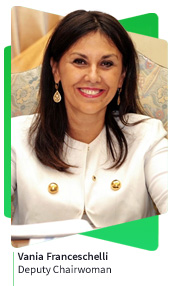|
 Vania Franceschelli Vania Franceschelli
Deputy Chairwoman
The importance of fighting for gender equality in the financial advice industry
Gender equality is a key point in the 2030 Agenda for Sustainable Development adopted at the United Nations Sustainable Development Summit on 25th September 2015. The plan set by the Agenda is formed by 17 goals that aim to preserve our planet for future generations, to ensure the prosperity of all human beings, to foster peaceful, just and inclusive societies and to enhance global partnership among all countries, stakeholders and people.
If we focus on the gender gap topic, some progress has been achieved over past years and decades: more women are going to school, are able to make their own life choices and have reached leadership roles, both in political and corporate scenarios. Legislation is also beginning to protect women’s rights and freedoms. However, many challenges must still be overcome as several laws and norms are uneven and outdated and violence is always present as 1 in 5 women, between the ages of 15 and 49, report at least one episode of physical violence (based only on reported cases, which are the minority). Women are also still underrepresented at various levels of political leadership and in working environments compared to men. Pay equality for the same tasks and jobs should be the norm, but it’s still a taboo in many advanced economies as well.
Moreover, the outbreak of the COVID-19 emergency could put at risk part of the progress achieved in the last few decades, as the pandemic may emphasize already-existing inequalities in all social and governance fields. This is due to the fact that women are more severely hit by the health and economic effects of the virus. In fact, the amount of unpaid work that women carry out has increased because of school closures and the rise of necessary care for older people. According to United Nations data, 60% of women work in the informal economy and this could determine a greater risk of falling into poverty. The necessary lockdown measures have led to a steep increase in the cases of domestic violence against women and girls, as many were trapped with their abusers, according to data and reports collected by national authorities as well as organizations like the Human Rights Watch that works closely with the UN.
Although difficulties for women increased during the pandemic, this could be an opportunity to enhance responsibility towards gender equality and develop targeted response by keeping in mind the gender impact when developing COVID-19 response plans, budgeting and resources. This emergency could be a chance for radical, positive action to redress long-standing inequalities in multiple areas of women’s lives and build a more just and resilient world.
For this reason, UN Women, the United Nations organization that is the global champion for gender equality, has developed five priorities to mitigate the impact of COVID-19 on women:
- Gender-based violence, including domestic violence, is mitigated and reduced
- Social protection and economic stimulus packages serve women and girls
- People support and practice equal sharing of care work
- Women and girls lead and participate in COVID-19 response planning and decision-making
- Data and coordination mechanisms include gender perspectives
This situation is deeply linked to the financial advising industry as well. Our reality lacks an equal and even representation between men and women: the CFP (Certified Financial Planner) Board, a financial advisor organization based in the US, states that only 23% (of its 86,000 members) are women. In Europe the situation is similar, with around 20% of financial advisers being women, clearly a minority. This is in strong contrast with results emerging from multiple studies, such as the one carried out by Assogestioni, the Italian association responsible for asset management firms. This survey highlighted how 40.3% of Italian citizens would prefer investing in a company or mutual funds led by women and 39.9% would do so by choosing a female financial advisor as a reference point. It is therefore clear that the presence of women in the advising industry is below the demand required by the public and this represents a chance for improvement and evolution.
A question naturally arises: why is it so important to have a fair representation of women in our profession? The same study by Assogestioni, in accordance with many others rolled out by Accenture, Milliman and other firms, proved that female financial advisors tend to be more likely to keep a cool head when talking about investing, a field where men (on average) appear to lose their nerves more easily. This seems to be due to the fact that women have a wider vision, based on achieving the goals agreed with their clients in the longer term, while men tend to be more worried about preserving their customers’ wealth in the short and immediate term.
At the same time, having an appropriate proportion of women is important for advising teams, composed of different financial advisors working together, asset management firms that need to link the trading operations of funds with the retail and institutional investors, and even for the industry as a whole. The positive effect for all these categories is represented by diversity, the enhanced value brought by variety. Women can offer a different point of view and diverse skills and attitudes, bringing additional motivation and better results in teams. This is the reason behind the choice of many firms to encourage diversity in terms of gender, culture and background.
A last important aspect is that women often prefer to be followed or advised by another woman. This is due possibly to a deeper understanding and affinity that results in a much more shared horizon and empathy in goals achievement. Being surrounded with collogues of the opposite sex is a way to enrich everybody’s own views and knowledge, for both men and women. This is why gender equality should be in everybody’s interest and something to fight for.
|